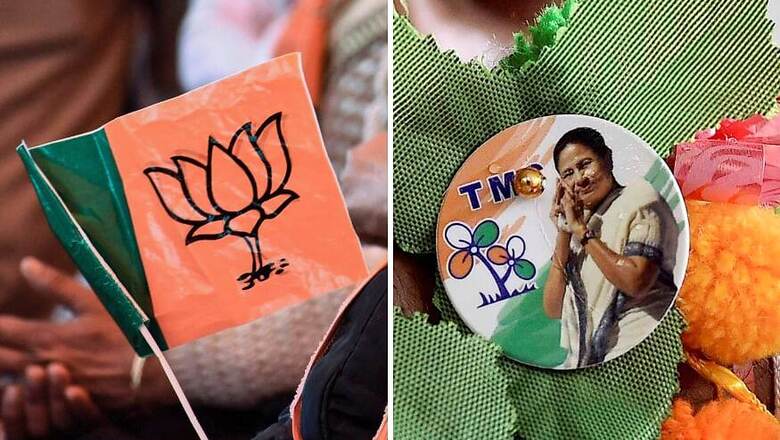
views
Kolkata: With the introduction and passage of the Citizenship (Amendment) Bill (CAB) in the Lok Sabha on Monday, the ruling Bharatiya Janata Party (BJP) at the Centre seems to have its eyes fixed on the ‘refugee voters’ in West Bengal who exist in substantial numbers in nearly 70 of the state’s 294 assembly segments.
Apprehensions over a nationwide National Register of Citizens (NRC) proposed by the Union government is one of the key reasons attributed by analysts to the BJP’s loss to Bengal’s ruling Trinamool Congress (TMC) in last month’s bypolls for three assembly seats.
The CAB seeks to grant Indian citizenship to non-Muslim refugees from Pakistan, Bangladesh and Afghanistan fleeing religious persecution there. On December 4, the Union Cabinet passed the Bill in a meeting. It has been introduced in the Lok Sabha on Monday and is expected to be tabled in the Rajya Sabha on December 10 for passage.
The CAB is a long-pending demand of the refugees (mostly from the Matua community) in West Bengal who entered India from Bangladesh after 1971. They have voting rights in the state, but as per existing rules they are not Indians because Article 6 of the Constitution says anybody who entered the country from East or (then) West Pakistan after July 19, 1948, must apply for citizenship and the year 1971 automatically falls under this.
TMC leader Colonel Diptanshu Chaudhary (retired) said, “If the BJP is thinking that CAB is going to help it win the 2021 Assembly polls, then I would suggest its leaders stop daydreaming. They did the same thing in Assam and we all know what happened after that. They removed the names of nearly 13 lakh Hindus (out of nearly 19 lakh left out in the NRC). This has prompted the Assam BJP to demand a fresh NRC in the state. I think they are doing divisive politics in India through the NRC and the CAB. Our Chief Minister Mamata Banerjee has already said we are ready to support the CAB, but it should not be based on religion.”
In the 2019 Lok Sabha polls, it’s the refugees, particularly the Matuas, who helped the saffron brigade secure nine to 10 seats out of the 18 they ended up winning. The seats won by the party are Cooch Behar, Alipurduar, Jalpaiguri, Raiganj, Balurghat, North Malda, Ranaghat, Bangaon, Burdwan-Durgapur, Asansol, Darjeeling, Barrackpore, Hooghly, Jhargram, Midnapore, Purulia, Bankura and Bishnupur.
Of these, the Matuas were a factor in the first 10.
All the seats combined consist of nearly 70 assembly segments and this is the area the BJP is focusing on to reach the magic figure of 148 seats (of the total 294 elected, apart from one nominated) in the 2021 assembly polls.
Dr Mohit Kumar Ray, chief of the BJP’s refugee cell, said, “This Bill will be the future of Bengal. Nearly 1.5 crore Muslims illegally entered India from Bangladesh and 1 crore entered as victims of Partition. This Bill is very important to identify these 1.5 crore Muslims who infiltrated India. The bill is not about the BJP. It is about the dignity of the Bengalis who came here after Partition.”
Every day, 748 people slip into India from Bangladesh and about 85% of them settle in Bengal, Ray said. “This is alarming and no one is saying anything about it. We feel that this Citizenship (Amendment) Bill will certainly give long-pending rights to the refugees and empower our government to take stern action against the illegal immigrants,” he added.
When asked how important the ‘refugee vote’ is to the elections in Bengal, Ray said, “No doubt the figure is crucial but I can say that the BJP is not playing any electoral game here. This Bill is to regain the lost dignity of refugees – mainly for the Bengalis in Bengal.”
The refugees, mainly the Matuas, were a major political force behind TMC chief Mamata Banarjee in the 2011 assembly polls when she ousted the state’s Left Front government after 34 years.
Since then, in the 2014 Lok Sabha polls and the 2016 assembly elections, it’s only with the blessings of Binapani Devi Thakur – an influential Matua leader who died on March 5 – that the TMC is ruling the area.
However, the wind changed direction in this year’s parliamentary polls when the BJP managed to snatch seats from the ruling TMC by playing the CAB card.
The saffron party made inroads in tribal areas, including Jangalmahal (which consists of nearly 40-45 assembly segments) and, with support of the Matua community due to the pro-CAB stand. Analysts say the BJP is in a strong position in nearly 100-105 assembly segments, set to give a tough fight to the TMC.
Sensing this swing, Prime Minister Narendra Modi, employing the CAB, kicked off his campaign in Bengal on February 2 near the Matua ‘headquarters’ at Thakurnagar under the Bangaon Lok Sabha constituency that was later won by the BJP’s Shantanu Thakur.
At the time, Modi said, “During Partition, people from Afghanistan, Bangladesh and Pakistan fled amid communal violence. Sikhs, Hindus, Christians, Parsis faced grave atrocities. Now you tell me, after so many years, don’t you think they have every right to live with dignity here in India? Therefore, we brought this Citizenship (Amendment) Bill. But I would like to ask Mamata ji’s stand on this. I would like to assure you (the Matua community) that our government is with you on this issue.”
According to Sandip Kumar Biswas, secretary of the refugee welfare organisation Nikhil Bharat Bangali Udbastu Samanvay Samiti (NBBUSS), there are approximately six crore refugees in India, while in West Bengal alone the figure is around three and a half crore. They are a key factor for any political party in Bengal, he added.
“If passed by Parliament, the CAB will be a boon for the nearly 12 lakh Hindus whose names were removed from the NRC list in Assam,” Biswas said. “They will get a chance to opt for a legal solution and we feel that most of them (Hindus) will get the citizenship in Assam.”
Banerjee recently said her party will support the Bill only if citizenship is given to all communities. “If you discriminate on the basis of religion, we will oppose it and also fight against it,” she said.
State BJP leaders are already facing attacks over the NRC and this was evident in the recently held bypolls. In fact, the BJP candidate from Kaliaganj, Kamal Chandra Sarkar, blamed the counter-infiltration exercise for his defeat.
Observers say while the BJP is using the CAB in its bid to make electoral gains, the TMC is banking on the anti-NRC sentiment to consolidate Muslims votes.
“The idea is only to push the BJP’s Hindutva-based agenda in an effort to keep the vote bank intact before one can even gauge issues like the CAB’s long-term socio-political impact on Assam, Manipur and Tripura, among other northeastern states, and thereby the fragile peace in that region, as also the tribal belts of West Bengal and Jharkhand,” said Chaudhary. “The BJP’s only aim is to divide the Bengali Hindus and Bengali Muslims to polarise for their vote bank.”



















Comments
0 comment